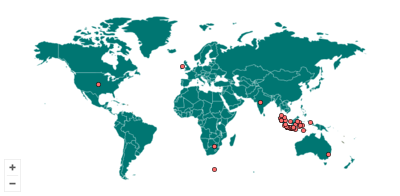IMPLEMENTATION OF INFAQ FUND MANAGEMENT ACCORDING TO LAW NUMBER 12 OF 2021 ON BAITUL MAL IN PIDIE DISTRICT OF INDONESIA
DOI:
https://doi.org/10.22373/al-mudharabah.v4i1.3315Keywords:
Akad Mukhābarah, Islamic Law,, Rice Field Management, Customary LawAbstract
Indonesia has a state foundation, namely Pancasila. Caring for others is manifested through giving zakat, donations and giving alms. Interestingly, in Baitul Mal, income from infaq funds is regulated in Pidie Regent Regulation Number 12 of 2021 concerning infaq funds being charged. So in this work the researcher wants to look further into the implementation of Infaq management in Baitul Mal, Pidie Regency, how the Pidie Regency Regent's Regulation Number 12 of 2021 is compatible with Aceh Qanun Number 3 of 2021 and Islamic views with these regulations. The research method that the author uses in this discussion is the descriptive analysis method, namely to present a systematic and accurate description of the facts of the object to be studied, namely the description that the author will make based on data obtained from interviews with one of Baitul Mal Pidie and from several document sources and also open books which also contain how infaq management should be implemented. After seeing how infaq is regulated in Islam, and how infaq is regulated in Pidie Regent Regulation Number 12 of 2021. There is a gap here, which is why in the Regent's Regulations a reference is given to the level of Infaq and Islam does not regulate it, so that deducting Infaq from the monthly salary is not recommended because it violates one of the pillars of Infaq, namely that there is no element of compulsion in it.
References
Abd al-Mu’min al-Khinṣī al-Ḥusainī, Kifāyah al-Akhyār fī Ḥallin Ghāyah al-Ikhtiṣār, Jeddah: Dār al-Minhāj, 2016.
Abd al-Wahhāb Khallāf, ‘Ilm Uṣūl al-Fiqh, Terj: Moh. Zuhri dan Ahmad Qarib), Edisi Kedua, Semarang: Dina Utama, 2014.
Abdul Manan, Pembaruan Hukum Islam di Indonesia, Jakarta: Kencana Prenada Media Group, 2017.
Abdullah Amrin, Asuransi Syariah: Keberadaan dan Kelebihannya di Tengah Asuransi Konvensional, Jakarta: Elex Media Komputindo, 2006.
Abī Bakr al-Qurṭubī, al-Jāmi’ al-Aḥkām al-Qur’ān, Juz 1, Bairut: Mu’assasah al-Risālah, 2006.
Abū al-A’lā al-Maudūdī, Niẓām al-Ḥayāh fī al-Islām, Translate: Khurshid Ahmad, Arab Saudi: International Islamic Publishing House, 1997.
Arskal Salim dan Adlin Sila, Serambi Mekah yang Berubah, Tangerang: Pustaka Alvabet, 2010.
Asep Subhi dan Ahmad Taufik, 101 Dosa-Dosa Besar, Jakarta: Qultum Media, 2004.
Dīb al-Khuḍrāwī, Qāmūs al-Fāẓ al-Islāmiyyah: ‘Arabī Inkilīzī, Damaskus: al-Yamāmah, t. tp.
Forum Lanskap Aceh Selatan,Rencana Konservasi Bentang AlamKabupaten Aceh SelatanProvinsi Aceh, Aceh Selatan: United States Agency For International Development, 2014.
Harun, Fiqh Muamalah, Surakarta: Muhammadiyah University Press, 2017.
Hasbiyallah, Sudah Syar'ikah Muamalahmu?: Panduan Memahami Seluk-beluk Fiqh Muamalah, Yogyakarta: Salma Idea, 2014.
Khairul Ikhwan Damanik, dkk., Otonomi Daerah, Etnonasional-isme, dan Masa Depan Indonesia: Berapa Persen Lagi Tanah dan Air Nusantara Milik Rakyat, Jakarta: Yayasan Pustaka Obor Indonesia, 2010.
M. Quraish Shihab, Kaidah Tafsir: Syarat, Ketentuan, dan Aturan yang Patut Anda Ketahui dalam Memahami Ayat-Ayat Alquran, Tangerang: Lentera Hati, 2013.
Muḥammad Abū Zahrah, al-Zahrah al-Tafāsīr, Kairo: Majma’ al-Buḥūṡ al-Islāmiyyah, 1987.
Muḥmammad ‘Abd al-‘Āṭī Abdul Alī, al-Maqāṣid al-Syar’iyyah wa Aṡaruhā fī al-Fiqh al-Islāmī, Kairo: Dār al-Ḥadīṡah, 2007.
Rendy Adi Wilaga, dkk, Sistem Pemerintahan Indonesia, Yogyakarta: Budi Utama, 2018.
Ridwan Nurdin, Akad-Akad Fiqh pada Perbankan Syariah di Indonesia: Sejarah, Konsep dan Perkembangannya, Cet. 2, Banda Aceh: Yayasan PeNA, 2014.
Syamsuddīn al-Żahabī, al-Kabā’ir, Terj: Abu Zufar Imtihan al-Syafi’i, Solo: Pustaka Arafah, 2007.
Tuismadi, Kecamatan Samadua dalam Angka 2018, Aceh Selatan: Badan Pusat Statistik, 2018.
Wahbah al-Zuḥailī, al-Fiqh al-Islāmī wa Adillatuh, Juz’ 7, Damaskus: Dār al-Fikr, 1985.
Wizārah al-Auqāf, Mausū’ah al-Fiqhiyyah, Juz’36, Kuwait: Wizārah al-Auqāf, 1995.
Yūsuf al-Qaraḍāwī, al-Ḥalāl wa al-Ḥarām fī al-Islām, Terj: M. Tatam Wijaya, Cet. 1, Jakarta: Qalam, 2017.
Downloads
Published
How to Cite
Issue
Section
License

This work is licensed under a Creative Commons Attribution-NonCommercial-ShareAlike 4.0 International License.












